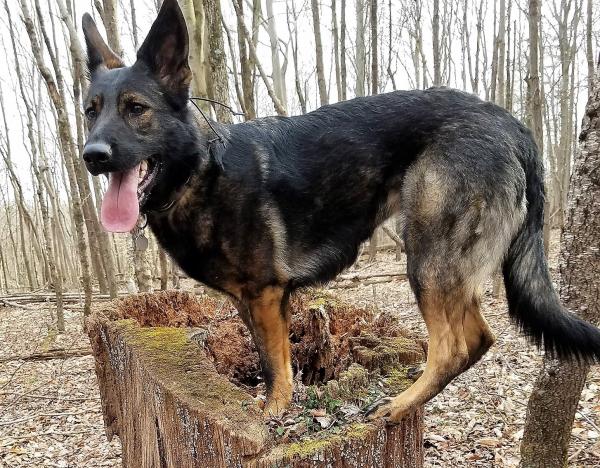When your dog is ill, you worry and take care of it. After all, humans have strong emotional attachments to their dogs. That’s not new. Humans have cared for their dogs for a long time—as much as 14,000 years, according to a new study. The study took a new look at remains from a burial site in western Germany that dates back roughly 14,000 years ago. Archaeologists discovered the site in 1915. At first people thought the grave contained the remains of one man, one woman, and one dog. More recent analysis showed that there were actually bones from an older dog, plus a puppy just over six months old.
That site is the oldest known burial of a domesticated dog, as well as the oldest grave to hold both people and canines. Researchers believe that the burial suggests that the people had an emotional bond with the dog. Emotional bonds are why we say we love our dogs and care for them, even when they’re sick or untrained.
In this prehistoric case, the puppy probably needed that kind of care. Due to its age and illness, the puppy likely was both untrained and hard to care for. Specifically, he appeared to have suffered from canine distemper. Symptoms within the first week can include a high fever, loss of appetite, lethargy, vomiting, diarrhea and dehydration, according to the study. Additional symptoms after that include pneumonia, laryngitis, rhinitis, seizures and other problems, the researchers add.
Caring for dogs with canine distemper is difficult, even now. “Without adequate care, a dog with a serious case of distemper will die in less than three weeks,” explained Luc Janssens, a PhD candidate and veterinarian at the Universiteit Leiden in the Netherlands and lead author of the study.
Yet the evidence shows that this dog survived for at least 11 weeks after contracting the virus.
To the researchers, it’s obvious that the humans in the little pup’s life must have cared for him. That care “would have consisted of keeping the dog warm and clean” as well as hydrated and gently fed,Luc said. And, he added, “While it was sick, the dog would not have been of any practical use as a working animal.”
The most likely reason that the humans nursed the little dog was because they cared and felt a two-way bond between the pup and themselves. Halo knows that such bonds are important, even today. In his journal article, Luc and his team conclude that humans 14,000 years ago in the Late Pleistocene era, “may have developed emotional and caring bonds for their dogs, as reflected by the survival of this dog, quite possibly through human care.”
Fortunately, modern dogs can get protection from canine distemper from an effective vaccine. Yet although much has changed, it’s good to know that some things still stay the same — like caring for our pets when they do get sick.
Good care matters even when our pets feel well. Halo believes in going back to more original, native ingredient sources, such as cage-free chicken, wild-caught salmon, pasture-raised beef, and non-GMO fruits and vegetables. We can show our love for our dogs by feeding them high quality Halo dog food and treats. Humans knew enough to love their dogs 14,000 years ago. That’s one tradition we’re thankful to still continue.


Kristy
Bethany Meissner, thanks for the article post.Really thank you! Great.
Martijn
I just watched a video where a woman considered her pit bull dogs in character to this video. Today she is dead.she took her dogs out for a walk in the woods .her body was found with canine teeth marks where they (her own loving Pitties) attacked and ate part of her. The question is why?